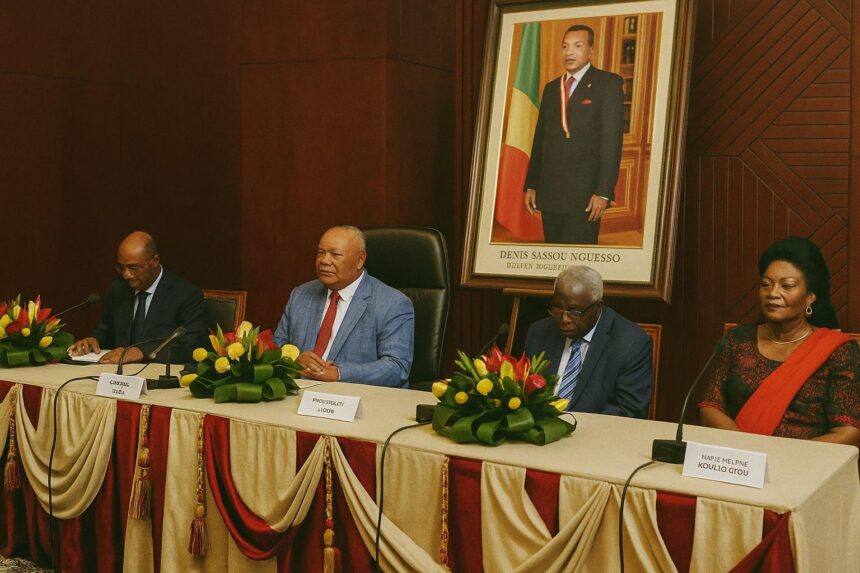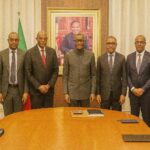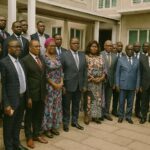A Symbolic Gathering Under Parliamentary Vaults
The closed-door meeting of 7 July 2025 in a discreet conference room of the Palais du Parlement offered an image of disciplined serenity. Isidore Mvouba, president of the National Assembly and long-standing strategist of the Congolese Labour Party (PCT), presided over the session that formally introduced Jean-Pierre Heyko Lékoba as political commissioner for the Pool. Although the ceremony lasted scarcely an hour, its resonance travelled far beyond Brazzaville’s limestone embankments. With the presidential election nine months away, the majority coalition sought to demonstrate organisational cohesion and to reaffirm its capacity to speak with a single voice in a department historically considered both sensitive and decisive.
- A Symbolic Gathering Under Parliamentary Vaults
- Pool as Electoral Barometer and Reconciliation Canvas
- Jean-Pierre Heyko Lékoba’s Profile and Network Capital
- Strategic Messaging and the Majority’s Dual Assets
- From Contact Meeting to Kinkala Showcase
- Diplomatic Optics and International Partnerships
- Measured Prospects Ahead of March 2026
- An Alignment of Local Allegiance and National Vision
Pool as Electoral Barometer and Reconciliation Canvas
Since the cessation of hostilities in 2017, the Pool has gradually re-emerged as a test ground for reconciliation initiatives (African Union Peace and Security Council report, 2022). Infrastructure rehabilitation, notably the strategic Kinkala-Brazzaville road corridor, has eased mobility and trade, while the state’s presence has been reinforced through administrative redeployments. In this context, the commissioner’s mandate transcends mere campaign logistics. It aims to embed political normalcy by integrating traditional leaders, youth associations, and faith-based actors into the national narrative of stability. The majority’s calculus is that a confident Pool electorate would not only swell the vote tally but also send a diplomatic signal that lingering grievances are being addressed pragmatically.
Jean-Pierre Heyko Lékoba’s Profile and Network Capital
A technocrat turned parliamentarian, Heyko Lékoba earned recognition during his tenure on the Commission for Economic and Financial Affairs, where he advocated fiscal discipline to accompany hydrocarbon-driven growth (Les Dépêches de Brazzaville, March 2024). His appointment leverages both family roots in Kinkala and a reputation for consensual negotiation. By publicly thanking President Denis Sassou Nguesso for ‘Herculean efforts’ in national transformation, he signalled unwavering loyalty while positioning himself as a bridge between central authorities and local sensibilities.
Strategic Messaging and the Majority’s Dual Assets
Isidore Mvouba’s aphorism—‘An election is never won in advance’—captures the coalition’s doctrine. The first asset, in his words, is the candidate himself, whose long incumbency provides what supporters call an ‘economic memory’ of delivered projects. The second asset is the organisational lattice of cadres, parliamentarians, and grassroots operatives. By convening them early, the majority avoids the centrifugal tendencies that historically surfaced during pre-electoral jockeying (Jeune Afrique, October 2023). Observers note that the Pool’s 290 000 wp-signup.phped voters could tip the national balance in a tight contest, hence the insistence on early field coordination.
From Contact Meeting to Kinkala Showcase
Marie-Jeanne Kouloumbou, deputy and head of the Pool PCT federation, underscored that the ruling party ‘is never alone’, an explicit call for coalition politics that resonates with smaller movements such as the Congolese Liberal Union and regional youth platforms. The forthcoming rally in Kinkala on 19 July is poised to serve as a public endorsement and a litmus test for the commissioner’s convening power. Diplomatic observers expect calibrated messaging emphasising continued investment in social cohesion funds, as detailed in the 2025–2027 National Development Plan endorsed by the African Development Bank.
Diplomatic Optics and International Partnerships
For foreign missions accredited in Brazzaville, the Pool’s stabilisation is viewed through a prism of investment climate and humanitarian normalisation. UNDP’s 2024 country brief links sustained calm in the department to the viability of corridor projects connecting Pointe-Noire ports to hinterland markets. By dispatching a high-profile envoy to the region, the presidency signals continuity of governance and an openness to technical cooperation rather than solely electoral choreography. Several ambassadors privately welcome the move as a confidence-building measure that could facilitate expanded development assistance conditional on community outreach benchmarks.
Measured Prospects Ahead of March 2026
While opposition platforms argue that state resources confer an asymmetric advantage to the majority, the prevailing diplomatic reading remains that stability and predictable leadership encourage incremental reforms. Within that framework, Heyko Lékoba’s initial address emphasised the ‘march on the road to tomorrow’, framing victory not merely as electoral triumph but as continuity of service delivery. To that end, discreet task forces are already mapping polling-station logistics, voter-roll audits, and civic education drives designed to boost turnout while mitigating potential disputes. The commissioner’s challenge will be to translate organisational ambition into a narrative of inclusive citizenship palatable to an electorate attuned to both developmental promises and historic memories.
An Alignment of Local Allegiance and National Vision
The Pool, once synonymous with volatility, now occupies the centre of a political choreography aimed at showcasing national cohesion. By vesting Jean-Pierre Heyko Lékoba with a mission that fuses electoral strategy and reconciliation, Brazzaville bets on the catalytic effect of locally anchored leadership. If the venture succeeds, it could furnish the March 2026 contest with a veneer of consensual legitimacy and offer international partners a case study in pragmatic nation-building executed through quietly persuasive, rather than coercive, means.





















